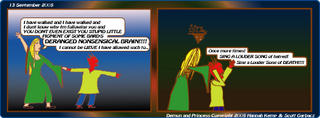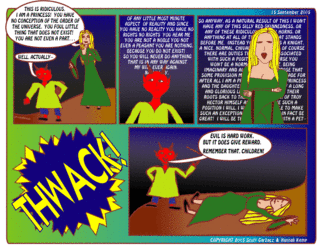
Click Thumbnail for Full-Size Comic
Navigation Archive First Comic Previous ComicNext ComicMost Recent ComicNews:Scott:
New Site is also up!
Though, for the time being, this is the primary site; eventually I will be able to have a more webcomic-oriented site at Comicgenesis, but for now I like the reliability of Blogger.
Scott again:
Okay, so I think I am going to begin a little educational miniseries here in the Newsbox. This one is the Introduction.
Mysteeeeeeeeerious Introduction (Apologies to
Pete Abrams for blatant thievery.)
My favorite author, not surprisingly, is J. R. R. Tolkien. The man pretty much defined the modern fantasy genre -- he invented (or practically invented): Orcs, Dark Lords, Nameless Dreads, Halflings, Quests to Save the World, High Elves, and a million things that the typical modern fantasy is all about. If you haven't read
The Lord of the Rings, then quit reading this comic, and go read
The Lord of the Rings. The movies don't count, because even though Peter Jackson is brilliant, they just aren't the books, and the books are wonderful. You'll laugh, you'll cry, you'll cheer, all that rigamarole. And you'll thank me.
And, of course, once you've finished reading
The Lord of the Rings, you'll come back, and you will have pretty much the same appreciation for the comic as you had before. But at least there will be more comics for you to read.
Because, all my respect for Tolkien aside, he neither invented fantasy nor entirely dominates it. From the ancient and Medieval legends that are pretty much the roots of all fantasy to Edgar Rice Burrows'
Princess of Mars to Ursula K. Leguinn's Earthsea series*, there is a large and vibrant non-Tolkien fantasy tradition. Therefore, I introduce the series:
Quests, Faerie and Really Weird Stuff: The Non-Tolkien Roots and Branches of Western Fantasy LiteratureFirst up: The original self-conscious fantasy, the original novel, and the original fantasy-spoof -- all tied together in one neat package! Yup, I'm talking about
Don Quixote de la Mancha, the great Spanish novel published by Cervantes in two parts in 1605 and 1615.
* I am well aware that Ursula K. Leguinn not only knew of Tolkien but was a great fan and took great inspiration from his writings. However, her Earthsea novels represent a type of fantasy that is far removed from Tolkien's heroic tale -- something slower, quieter, more prosaic and more character driven. Thus she gets included as an example of "non-Tolkien" fantasy literature.






 Click Thumbnail for Full-Size Comic
Click Thumbnail for Full-Size Comic Click Thumbnail to View Fullsize Comic
Click Thumbnail to View Fullsize Comic